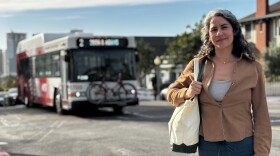David Jones crosses the border regularly, usually in a car. He’s a chef who lives and works in Rosarito. Like many Americans in Baja, he’s able to live there at the discretion of the Mexican government.
After a trip to Washington, D.C. earlier this month, he was crossing on foot back to Tijuana when a Mexican immigration agent singled him out and told him he wouldn’t be able to cross that day.
Since March, restrictions put in place by both the U.S. and Mexico have supposedly closed the border to everyone without “essential" reasons to cross.
But as Jones watched others cross without a problem, he believed the reason he was stopped was because he’s black.
"I 100% believe it. There’s just no other way to identify it, when I know there are others who aren’t African-American who are able to come straight through," Jones told KPBS. "I was easy to identify, I was an American, and they can now give this spiel, our government says if you’re American, you can’t come across."
Jones was eventually able to cross, after telling agents that all his belongings were still in Mexico. He knows other Americans living in Baja who haven’t had any scrutiny while crossing.
As many other people crossing the border during the pandemic can attest, enforcement of the “essential needs” only requirement has been spotty in both directions.
RELATED: Border Patrol Makes New Mother Choose Between Family Separation Or Return To Mexico
In some cases, its random enforcement has been tragic.
In June, 41-year-old Luis Martinez, a dual U.S.-Mexican citizen, died from COVID-19 in San Diego after falling ill while living with his partner in Tijuana. His partner, who had only weeks before given birth to their son, had a letter from Sharp Memorial hospital saying she should be able to cross to see her husband. She successfully crossed twice using the letter, but the third time, on June 17th, border agents denied her entry into the U.S.
Luis Martinez died hours later.
"The day before his death they denied her crossing," said Julia Najera, Martinez’s cousin. "She went to the border, told them what was happening, that it was a life and death situation, and the agent denied her crossing and said that it was because of the cases of COVID-19 across the border that he was denying her entry into the US."
The Consul General of Mexico in San Diego told KPBS that while “both countries have been emphatic to request the border population to reduce all non-essential travels,” it’s not possible for Mexico to verify the needs of everyone who crosses the border. Border agents have been doing random stops and some cities have set up sanitation stations at crossings.
Customs and Border Protection told KPBS that "CBP officers make the final determination of whether travelers are admissible to the United States at the port of entry, taking into account the totality of each traveler’s circumstances."
For Julia Najera, the uneven application of the restrictions can impact cross-border families forever.
"I know she kind of feels robbed of that last chance to see him and say goodbye and that, in turn, makes it a lot harder for her to accept that he’s gone at such a crucial and sensitive moment in their life," Najera said. "For a year now they’ve been looking forward to having a child. And now, none of that is happening for them."
Najera is hosting a GoFundMe to help support her cousin’s partner and their young son.







